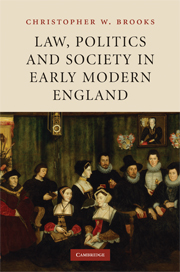Book contents
- Frontmatter
- Contents
- Preface
- Abbreviations and conventions
- 1 English history and the history of English law 1485–1642
- 2 Courts, lawyers and legal thought under the early Tudors
- 3 The initiatives of the crown and the break from Rome
- 4 Political realities and legal discourse in the later sixteenth century
- 5 The politics of jurisdiction I: the liberty of the subject and the ecclesiastical polity 1560 – c. 1610
- 6 The politics of jurisdiction II: multiple kingdoms and questions about royal authority
- 7 The absoluta potestas of a sovereign and the liberty of the subject: law and political controversy in the 1620s
- 8 The degeneration of civil society into a state of war 1629–1642
- 9 Law and ‘community’
- 10 The aristocracy, the gentry and the rule of law
- 11 Economic and tenurial relationships
- 12 The household and its members
- 13 The person, the community and the state
- 14 Conclusion
- Manuscript bibliography
- Index
- References
13 - The person, the community and the state
Published online by Cambridge University Press: 06 July 2010
- Frontmatter
- Contents
- Preface
- Abbreviations and conventions
- 1 English history and the history of English law 1485–1642
- 2 Courts, lawyers and legal thought under the early Tudors
- 3 The initiatives of the crown and the break from Rome
- 4 Political realities and legal discourse in the later sixteenth century
- 5 The politics of jurisdiction I: the liberty of the subject and the ecclesiastical polity 1560 – c. 1610
- 6 The politics of jurisdiction II: multiple kingdoms and questions about royal authority
- 7 The absoluta potestas of a sovereign and the liberty of the subject: law and political controversy in the 1620s
- 8 The degeneration of civil society into a state of war 1629–1642
- 9 Law and ‘community’
- 10 The aristocracy, the gentry and the rule of law
- 11 Economic and tenurial relationships
- 12 The household and its members
- 13 The person, the community and the state
- 14 Conclusion
- Manuscript bibliography
- Index
- References
Summary
Earning a living
If it was thought perfectly natural that law and the ‘public interest’ should intervene in the private lives of families, it follows as self-evident that it should also have been involved in those aspects of ‘political economy’ that took place beyond the household, in the streets, the alehouse, the guildhall or the marketplace. This was of course most uncontroversial in connection with obvious infractions of the criminal law, where mutual protection mandated collective vigilance. As the complier of statutes Ferdinando Pulton put it, while private suits might be considered private matters, criminal cases were the ‘concern of all men’, and since all men benefited from the common peace, all were required from time to time to participate in the maintenance of it. Yet, as many historians have pointed out, the use of legal sanctions to govern personal behaviour in the early modern period often seems to have been more comprehensive than this, and, according to some accounts, it was also the source of hegemonic power that the social elite could use to exercise political and social control. Consequently, the aim of this chapter is to investigate the relationship between the individual person and society at large, primarily by examining the nature and extent of constraints on what could be said in public and what could be done in public spaces outside the household.
- Type
- Chapter
- Information
- Law, Politics and Society in Early Modern England , pp. 385 - 422Publisher: Cambridge University PressPrint publication year: 2009

